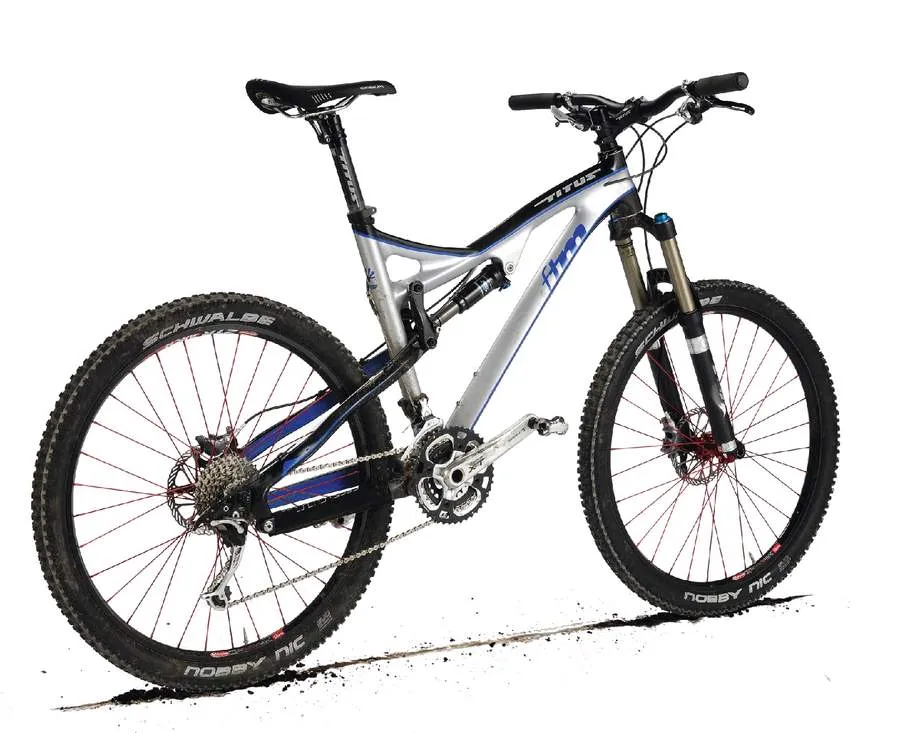Tempe, Arizona-based Titus began in 1991, specialising – as their name suggests – in titanium hardtails. The wonder aerospace material was a hot ticket back then, but times change and Titus have moved with them to embrace alternative materials, including aluminium and carbon.
Their 135mm-travel trail full-susser, the FTM, is available in all three flavours. We opted for the full-carbon version, which – at £1,999 for a frame – offers a weight advantage over the aluminium option (£1,799) without going to the wallet-emptying extremes of the top-of-the-range titanium FTM (£3,199).
The Titus FTM Carbon is light and plush, with that indefinable vibration-damping feel that characterises carbon frames. The 140mm fork feels too long and contributes to a wandering front end at low speeds, but this bike is ideal if you’re a smooth rider looking for the ultimate mile-munching machine.
Ride & handling: Lithe, plush carbon mile-muncher that delivers effortless pace
The FTM carbon is a seriously fast bike. With its sub-25lb overall weight, a stiff frame structure and rear suspension that’s both plush and pleasingly pedal-neutral, this is a very easy bike to wind up to eye-watering speeds. The beautifully balanced Fox shocks fitted to both ends of our test bike soaked up everything we could throw at them, while the carbon chassis delivered the vibration-absorbing tautness for which the material is famous.
It’s not perfect, though. In spite of a set of numbers that look about right for a 135mm bike, at first we found ourselves occasionally gouging clods of turf from the edges of the trail with our pedals. A tad less sag in the shock helped matters, but there was a related problem: at its longest 140mm setting, the Fox fork felt too long, giving the front end a lazy waywardness on steep climbs that had us scrabbling for the TALAS travel-adjust dial and flicking it to 120mm. This improved things in the steering department, but dropped the bottom bracket a bit lower.
Last year’s FTM was, we’re told, occasionally criticised for a bottom bracket that sat too high. This year’s should be on the money, but something about the FTM’s rear suspension seems to make it sit further into its travel than a number of other bikes. Don’t get too hung up on these points, though. Despite our nit-picking, this is one of the fastest mid-travel trail bikes around.
With a slightly shorter fork and careful rear shock setup, the FTM carbon is capable of blistering speed and without the geometry issues, this would have scored even higher. It’s light enough to embarrass some cross-country race bikes and has enough travel to keep up with the all-mountain brigade on the descents.
Frame & equipment: Despite concerns over the front end geometry, this is a quality chassis
The big advantage of carbon over the various metal alloys for a frame designer is that material can be put exactly where it’s needed and removed from where it isn’t. The end result here is a chassis that barely has a straight line. So the top tube fuses into the head tube, which in turn morphs into the down tube, and that blends into the bottom bracket and so on.
And all this comes with a healthy weight saving, too. The FTM carbon frameset weighs a claimed 5.25lb with rear shock – positively anorexic for a bike with 135mm of rear wheel travel. Elsewhere, the suspension is handled by a classic Horst Link setup, with a pivot in front of and below the dropout, and linkage-activated shock.
One of carbon’s drawbacks as a frame material is that it can be susceptible to failure as a result of invisible damage caused in crashes. Titus’s inclusion of a stainless steel plate under the down tube and above the bottom bracket area is a sensible precaution that should help prevent damage from any rocks flicked up by the front wheel.
Hard-wearing paint and lacquer should also help. But owners should take extra care to avoid big scrapes and dents and have crash damage inspected by a savvy bike shop. Titus’s partial internal routing suits the frame’s clean lines but, as with any internally routed bike, you should allow extra time when it comes to changing the housings.
The finish on our test bike was below par in a couple of areas, but we’re told that it was an early production sample and that these bugs have been ironed out on the full production versions of the FTM.
Titus distributors Axel Imports kitted our test bike out with a Shimano XT-based transmission and own-brand finishing kit, with a dose of trail fashion provided by a pair of shiny red Industry Nine wheels. It’s all good stuff, and enough to bring the overall weight comfortably below 25lb.

